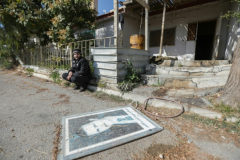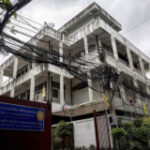Torture survivor Mohammed Najib dreaded being taken by his jailers to a military hospital where he was beaten
DAMASCUS – Former Syrian detainee Mohammed Najib has suffered for years from torture-induced back pain. Yet he dreaded being taken by his jailers to a military hospital, where he received beatings instead of treatment.
The prison guards forbade him from revealing his condition, only sending him to hospital for his likely tuberculosis symptoms — widespread in the notorious Saydnaya prison where he was detained.
Doctors at Tishreen Hospital, the largest military health facility in Damascus, never inquired about the hunch on his back — the result of sustained abuse.
Freed just hours after the fall of Bashar al-Assad, Najib has a tennis ball-sized bulge on his lower back.
The 31-year-old can barely walk, and the pain is unbearable.
But he insisted on showing AFP around a jail in the military hospital compound.
“I hated being brought here,” Najib said as he returned with two friends who had shared the same cell with him after they were accused of ties to the armed rebellion that sought Assad’s overthrow.
“They hit us all the time, and because I couldn’t walk easily, they hit me” even more, he said, referring the guards.
Because he was never allowed to say he had anything more than the tuberculosis symptoms of “diarrhoea and fever”, he never received proper treatment.
“I went back and forth for nothing,” he said.
Assad fled Syria last month after Islamist-led rebels wrested city after city from his control until Damascus fell, ending his family’s five-decade rule.
The Assads left behind a harrowing legacy of abuse at detention facilities that were sites of extrajudicial executions, torture and forced disappearances.
Hours after Assad fled, Syrian rebels broke into the notorious Saydnaya prison, freeing thousands, some there since the 1980s.
Since then, Tishreen Hospital has been out of service pending an investigation.
– ‘Assisting torture’ –
Human rights advocates sa
Read More





